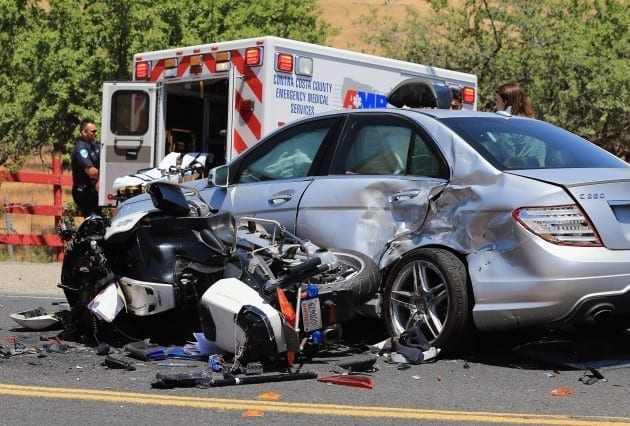Statements you might think are innocent or even meaningless could be twisted and used against you.
Ideally, insurance companies bail us out when we get into motorcycle accidents or encounter other unexpected costs. However, insurance companies never seem to want to do the job we hire them for, which is paying their customers according to their policies. People often talk to insurance companies, mistakenly believing that the insurance company is in their corner. After all, they have been paying for their insurance policies for years. However, insurance companies will use your own words against you as a way to get out of covering your damages after a motorcycle accident.
Talking to insurance companies regarding a motorcycle accident can feel like an intricate dance. One wrong move, and the entire situation goes south. It can be very easy to make damaging statements to an insurance company because we usually only speak with them when things are going terribly wrong. Motorcycle accidents are extremely dangerous, and you might have to talk to an insurance company while recovering from life-threatening injuries. You may even have to speak with an insurance company on behalf of a loved one who did not survive their accident. Your best choice is to hire a motorcycle accident attorney who can help you communicate with insurance in a way that is most likely to get you fair compensation for your damages.
Discussing Liability with Insurance Companies
One major question an insurance company will have after a motorcycle accident will be about who is liable for the accident. This question may affect cases differently depending on what state the motorcycle rider lives in. In some states, no-fault insurance allows riders to make claims without proving fault or liability. In many other states, riders must file claims with the other driver’s insurance company and prove the other driver was at fault.
If the question of fault or liability comes up, be careful how you talk about your accident. Insurance companies may try to use your statements as admissions of fault and avoid making payments. For example, if you said to an insurance company, “I’m so sorry about what happened,” they might use these statements as an admission of wrongdoing. They might argue that only someone at fault for the accident would feel the need to apologize. In reality, you may have said the statement absentmindedly or because you thought you were just being polite.
Insurance companies may also heavily question your evidence of another driver’s fault. For example, when explaining the accident as you witnessed it, using words like “I think,” “maybe,” or “I guess,” will be used against you. The insurance company may say that you sound unsure and question whether your statements can be trusted as accurate. You should discuss your case with an attorney first and then talk to the insurance company with more surety and more definite terms.
How to Talk About Damages with Insurance Companies
Talking about damages is similar to talking about fault, except you are proving the extent of your injuries and losses rather than who caused them. In some ways, this is a bit easier because you can back up your claims with documentation of your damages. Medical bills and invoices for motorcycle repairs can all be used to support your claims for damages. However, that will not stop insurance companies from scrutinizing everything you say.

Even if you are able to prove another driver was at fault and you are entitled to compensation from the insurance company, your damages may still be questioned or denied. Damages may be tangible losses, like medical bills, or intangible losses, like pain and suffering. Proving tangible losses may be easier than proving non-tangible losses, and you may need an attorney’s assistance to support your claims.
Remember to never downplay your damages. For some people, the need to maintain a stiff upper lip is so ingrained in them that they end up minimizing their injuries. You need to thoroughly explain to the insurance company that you were seriously injured and your life was derailed because of your motorcycle accident. Never tell an insurance company that you were injured, but overall, you are fine. People who are fine do not get compensation.
How to Talk About Settlement Negotiations with Insurance Companies
Discussions with insurance companies about your motorcycle accident do not always lead to courtroom litigation. In many cases, if not most cases, motorcycle accident claims are resolved with a settlement agreement between riders and insurance companies. Depending on where you live, you might settle with your own insurance or another driver’s insurance.
One crucial rule about settlement negotiations is to never accept the first offer. The way settlements typically work is the insurance company will make a very low offer, and you must make a much higher one. At the end of the day, the final settlement agreement will be somewhere in the middle.
An attorney will help you negotiate the best settlement possible. After a motorcycle accident, you might be feeling very scared and vulnerable. Insurance companies will take advantage of this vulnerability and try to pressure into accepting a low settlement. An attorney can help you determine how much your case is truly worth and get you a settlement as close to that value as possible.
Hire An Attorney to Help You Communicate with Insurance Companies
As mentioned above, attorneys are in the best position to help you communicate with insurance companies. Statements you might think are innocent or even meaningless could be twisted and used against you. Even if settlement negotiations break down and a lawsuit is in order, a personal injury attorney can help you speak to the insurance company in a way that minimizes wrongdoing on your part.


Join the conversation!